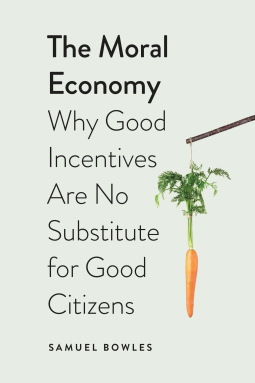
The Moral Economy
Why Good Incentives Are No Substitute for Good Citizens
by Samuel Bowles
This title was previously available on NetGalley and is now archived.
Buy on Amazon
Buy on BN.com
Buy on Bookshop.org
*This page contains affiliate links, so we may earn a small commission when you make a purchase through links on our site at no additional cost to you.
Send NetGalley books directly to your Kindle or Kindle app
1
To read on a Kindle or Kindle app, please add kindle@netgalley.com as an approved email address to receive files in your Amazon account. Click here for step-by-step instructions.
2
Also find your Kindle email address within your Amazon account, and enter it here.
Pub Date May 24 2016 | Archive Date Mar 07 2016
Description
Why do policies and business practices that ignore the moral and generous side of human nature often fail?
Should the idea of economic man—the amoral and self-interested Homo economicus—determine how we expect people to respond to monetary rewards, punishments, and other incentives? Samuel Bowles answers with a resounding “no.” Policies that follow from this paradigm, he shows, may “crowd out” ethical and generous motives and thus backfire.
But incentives per se are not really the culprit. Bowles shows that crowding out occurs when the message conveyed by fines and rewards is that self-interest is expected, that the employer thinks the workforce is lazy, or that the citizen cannot otherwise be trusted to contribute to the public good. Using historical and recent case studies as well as behavioral experiments, Bowles shows how well-designed incentives can crowd in the civic motives on which good governance depends.
Samuel Bowles directs the Behavioral Sciences Program at the Santa Fe Institute. He has taught economics at Harvard University, the University of Massachusetts, and the University of Siena and is the author of Microeconomics: Behavior, Institutions, and Evolution and (with Herbert Gintis) A Cooperative Species: Human Reciprocity and Its Evolution.
Should the idea of economic man—the amoral and self-interested Homo economicus—determine how we expect people to respond to monetary rewards, punishments, and other incentives? Samuel Bowles answers with a resounding “no.” Policies that follow from this paradigm, he shows, may “crowd out” ethical and generous motives and thus backfire.
But incentives per se are not really the culprit. Bowles shows that crowding out occurs when the message conveyed by fines and rewards is that self-interest is expected, that the employer thinks the workforce is lazy, or that the citizen cannot otherwise be trusted to contribute to the public good. Using historical and recent case studies as well as behavioral experiments, Bowles shows how well-designed incentives can crowd in the civic motives on which good governance depends.
Samuel Bowles directs the Behavioral Sciences Program at the Santa Fe Institute. He has taught economics at Harvard University, the University of Massachusetts, and the University of Siena and is the author of Microeconomics: Behavior, Institutions, and Evolution and (with Herbert Gintis) A Cooperative Species: Human Reciprocity and Its Evolution.
Advance Praise
"The Moral Economy is a brilliant book. Rarely have such big ideas been communicated in such a compact package. This book should change the way political leaders, policy makers, and social scientists of all stripes do their work and understand the work that they do."—Barry Schwartz, author of Practical Wisdom and Why We Work
"The Moral Economy plows new ground in exploring how the actions we take are motivated by their meaning. Samuel Bowles is proposing a paradigm shift in how we think about our lives and about economics."—George Akerlof, Nobel Laureate in Economics
"The Moral Economy plows new ground in exploring how the actions we take are motivated by their meaning. Samuel Bowles is proposing a paradigm shift in how we think about our lives and about economics."—George Akerlof, Nobel Laureate in Economics
Available Editions
| EDITION | Hardcover |
| ISBN | 9780300163803 |
| PRICE | $27.50 (USD) |
Average rating from 5 members
Readers who liked this book also liked:
That's Not How We Do It Here!
John Kotter; Holger Rathgeber
Business, Leadership, Finance, Nonfiction (Adult)
John Kotter; Holger Rathgeber
Business, Leadership, Finance, Nonfiction (Adult)






